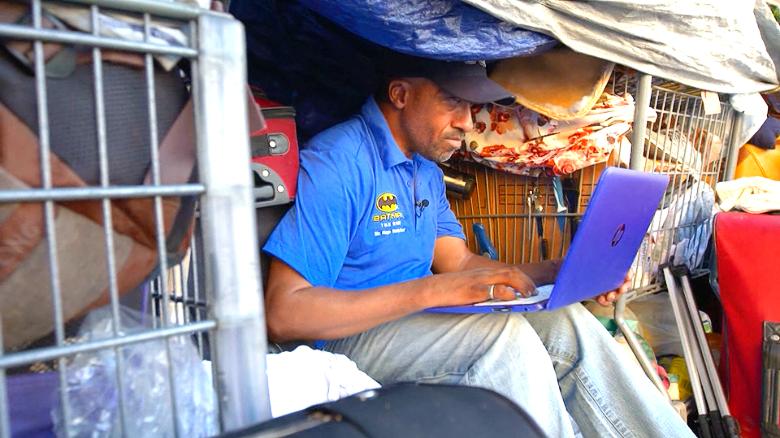He expressed sympathy for real estate investors here and other Californians whose property values or quality of life are threatened.
“In many cases, they came from other countries and they moved to Los Angeles or they moved to San Francisco because of the prestige of the city, and all of a sudden they have tents,” Trump said. “Hundreds and hundreds of tents and people living at the entrance to their office building. And they want to leave.”
In Los Angeles and San Francisco, Trump said, people are living on the “best highways, our best streets, our best entrances to buildings . . . where people in those buildings pay tremendous taxes, where they went to those locations because of the prestige.” ...
Trump has characterized the homeless problem in California and other places as a “disgrace,” saying this July: “We may do something to get that whole thing cleaned up. It’s inappropriate.” He more recently directed aides to figure out “how the hell we can get these people off the streets,” one senior administration official said.
As always, tRump offers a clear response to What Would Jesus Do?
Of course, I am not the only one who is angry at this President's inhumane approach to homelessness, and to the hypocrisy of his bible-thumping supporters. This columnist, for instance, offers to rewrite a King tRump version of the bible, and suggests many sarcastic interpretations of Jesus' thoughts, like this one:
“A righteous man rounds up the poor and puts them someplace where people don’t have to see how gross they are; a wicked man allows people who pay tremendous taxes to be inconvenienced.”
This is how you make god great again!
Here is one exhibit that tRump and his supporters wouldn't even care about. A local story of a homeless woman who was run over by a garbage truck. She was once the kid on the right in this photo:
Much later, she was the mother in this photo:
She was 57 years old and homeless when she died.
Annette Lorraine Montero, unhoused and apparently suffering from mental illness, was run over and killed by a garbage truck as she slept in a parking lot near downtown Eugene.
Here's another exhibit, from Los Angeles. The homeless man in the photo below was not born homeless. "He was a Yale graduate, Wall Street banker and entrepreneur."
Homelessness is a complex human problem. This horrible human being in the Oval Office doesn't have an iota of empathy in him to begin to understand is not a surprise. What excuse do the followers of Jesus have?
And if we cannot empathize with a fellow human right in front of our eyes, how are we going to even begin to understand the plight of humans far away, like the refugees fleeing wars?
And these are the same people who believe that I am going to hell because I am an atheist who does not believe in Jesus? If only they understood that it is we humans who create hell right here on earth. Why don't they want us to work together in order to create a heaven right here on earth!










